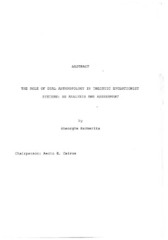The role of dual anthropology in theistic evolutionist systems : an analysis and assessment
Abstract
Triggered by the insistence of some theistic
evolutionist models on the indispensability for their
systems of an anthropogenesis containing the idea of the
infusion of an immortal soul into an evolved pre-human body,
this research focused on identifying and assessing the role
of such appeal to dual anthropology. The study employs both
historical-theological and systematic-theological
methodologies and is sectioned in three major chapters.
After the introduction, which distinguishes between
theistic evolutionist systems appealing to dual anthropology
and those not appealing, chapter 2 analyzes and describes
the former and chapter 3 reviews the latter groups. These
chapters reveal that theistic evolutionist systems both
appealing and rejecting dual anthropology spread across all
Christian confessions and include remarkable Christian
theologians and scientists.
The theistic evolutionist systems that appeal to
dual anthropology do so from both philosophical and
theological considerations. The former represents the
dualistic ontology established by the Greek philosophy and
historically adopted in the Christian Church. The latter is
an attempt to salvage the core biblical narrative of the
salvation history by upholding its foundational doctrines of
the creation of a perfectly moral and conditionally immortal
man, and of the Fall from that status. Dual anthropology
accomplishes the role of "lifting" the pre-humans to that
absolute status by the idea of the infusion of the soul.
The device of appealing to dual anthropology appears
the best theological hope among the theistic evolutionist
systems. It rejects both the alteration of the foundational
'- Christian theology and such threatening concepts as
polygenism, unavoidable in the theistic evolutionist systems
not appealing to dual anthropology.
Beyond appearance, however, the appeal to dual
anthropology does not actually serve its purpose. On the
one hand, critiques notice that dual anthropology itself is
biblically and theologically unfounded. On the other hand,
the appeal to dual anthropology, while offering a sense of a
pre-Fall absolute moral stand of man, does not solve the
problem of death as a consequence of the Fall. This is
assessed in chapter 4.
This study, then, concludes in chapter 5 that
theistic evolutionism suffers an irremediable internal
incoherence: it faces the choice between keeping a biblical
anthropology but abandoning the essential Christian theology
and appealing to a non-biblical anthropology and claiming to
preserve the core biblical theology, but actually failing to
do so. Such a state leads one to conclude that theistic
evolutionism must be definitively re3ected as a viable model
of reconciliation between the scientific evolutionary
worldview and the biblical doctrine of creation.


